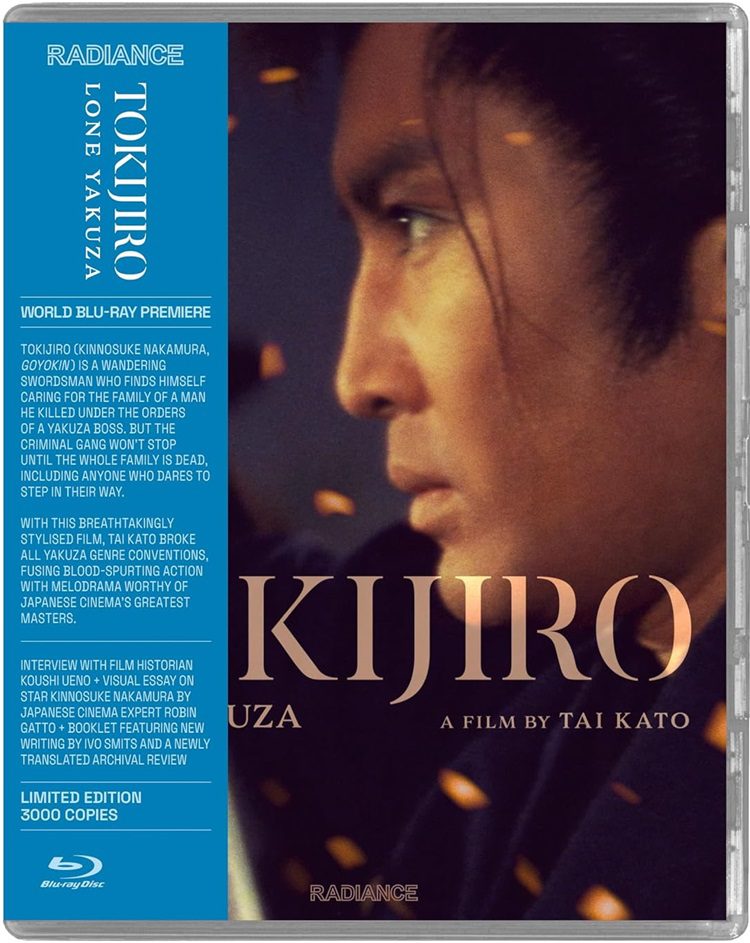
My expectations going into Tokijiro: The Lonely Yakuza were that it was going to be a fairly typical lone warrior-type tale. I assumed we’d follow a Yakuza master swordsman as he wandered about the Japanese countryside. Maybe he’d get into a tangle with some local boss and have to fight a series of increasingly difficult opponents. Or maybe he’d find himself involved with a pretty woman, or make friends with some villagers and reluctantly agree to help them with some problem.
Buy Tokijiro: The Lonely Yakuza Blu-rayAt first, this film seems to follow that pattern. Tokijiro (Kinnosuke Nakamura) is a roving gambler, with allegiances to no one. He became fed up with the yakuza way of life and freed himself, now roaming the Japanese countryside. Along with him is Asakichi (Atsumi Kiyoshi), who is a poor fighter and a bit of a clown, but also loyal and kind. Tokijiro repeatedly tells him he should go home and become a farmer for this way of life is not for him.
One night, they take a rest at a small inn. Tokijiro does a little gambling and Asakichi visits a brothel. Later, the owner will come to them explaining that some gangsters are coming to take control of the inn. She urges them to leave and gives them a small token for their trouble. Secretly, she’s hoping they will feel duty-bound to help them. Asakichi is willing to help but Tokijiro graciously accepts the money and leaves. Asakichi begs Tokijiro to stay, claiming it is the honorable thing to do, but he declines. They part ways and Asakichi goes back to the inn. Soon (but not soon enough), Tokijiro goes back. He finds his friend has been killed by the gangsters. Dispatching them quickly, he once again finds himself alone.
Later, he uses the hospitality of a local yakuza boss. But when danger starts brewing, he attempts to leave. The boss demands one favor from him before he can go. He must kill Sanzo (Azuma Chiyonosuke), the last member of a rival clan. Tokijiro reluctantly agrees and follows several soldiers to do the deed. But once there, he lets the others fight whilst he sits idly by, hardly even looking at the ongoing fight. Sanzo is a great fighter and is able to kill many of his enemies. With only two men left to fight, Tokijiro finally stands to do his duty. He compliments Sanzo on his skills and honor. He apologizes to the man noting that he is duty-bound to kill him, but he’s not happy about it. Sanzo understands and prepares to fight. Tokijiro deals a killing blow. Before Sano dies, he asks Asakachi to look after his wife Okinu (Junko Ikeuchi) and son.
Asakachi agrees and it is here that the film turns into something else. In a different film, certainly an American one, the fact that Asakachi killed her husband would become a great secret. He would tell her someone else did the deed to keep her from hating him. They would eventually fall in love and late into the film she would learn the truth and have to confront her mixed feelings about him. In fact, in an earlier version of this same story (for it is based on a book), Asakichi is unable to kill Sano, the leader of the yakuza gang does it. And so the relationship between Asakachi and Okinu is able to blossom unhindered.
But in this film, Asakachi immediately tells Okinu he has killed her husband and why. Another layer of tragedy is added to this for the two had met previously, on a long walk where they became close and Asakachi endeared himself to the boy. Asakachi’s feelings of duty compel him to take care of the two. He plans to take them to his hometown where one of his relatives will take them in. Okinu also feels some sense of honor, or perhaps she fears what will happen to her and her son if they walk alone. Either way, they leave together.
Before long, she becomes ill and Asakachi must take care of her even more. Feelings blossom, but neither can admit it over feelings of guilt stemming from his murdering of her husband. The film has moved from a well-executed but fairly typical yakuza action film, into something more emotional, more meaningful. It reminds me a bit of Crouching Tiger, Hidden Dragon in that way. Stylistically, the films are worlds apart but they both blend wonderful action setpieces with an impacting human drama and a romance that can never fully blossom.
Director Tai Katō handles both of these extremely well. The fight sequences are both immediate and intense. His camera cuts in close to the battles, giving it a visceral (and often quite graphic for the time) feel, while never losing sight of what’s happening between the men. The relationship between Asakachi, Okinu, and her son is well handled. Nakamura and Ikeuchi give nuanced performances allowing us to see a wealth of emotion brewing through their faces. Tokijiro: The Lonely Yakuza is not the film I was expecting at all, but as it turned out it was the film I needed.
Radiance Film’s new HD transfer looks quite lovely. The image detail is strong and I noticed no debris or other damage. Colors are natural and vibrant. Extras include a new interview with critic Ueno Koushi, who delves into the film’s source material and the career of director Tai Katō and where this film fits into it. There is also a video essay from Robin Gatto on the career of star Nakamura Kinnosuke. It also comes with a full-color booklet that has a (interestingly) negative contemporary review of the film and an essay from Ivo Smits.